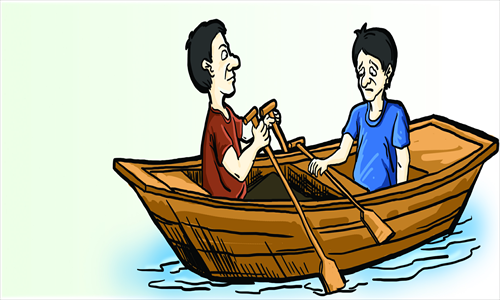HOME >> OP-ED
Taiwan prefers to remain on the fence with Japan, US
By Zhou Zhongfei Source:Global Times Published: 2012-8-29 22:35:04

Illustration: Sun Ying
Editor's Note:The Diaoyu Islands dispute touches the nerves of many in China. Facing rising tensions with Japan, there is a growing clamor for national cohesion and cooperation across the Straits. However, it seems rather difficult for Taiwan authorities to accept this. How should we interpret Taiwan's position over the Diaoyu Islands? Is unifying all Chinese to defend sovereignty possible? Two scholars share their views with the Global Times. In a recent interview with NHK, Japan's national broadcasting organization, Taiwan leader Ma Ying-jeou claimed that Taiwan had no intentions to join the mainland in the Diaoyu Island dispute against Japan. Regarding Ma's expression, the Sankei Shimbun commented that Ma's open attitude not to cooperate with the mainland was due to him cherishing relations with Japan and seeking to maintain a balance over the issue. While US scholar Richard Bush recently said that Taiwan has restrained itself over the sovereignty issue and emphasized a peaceful solution to territorial disputes, Taiwan has largely behaved as the US wished it to. The Diaoyu Islands belong to the Ilan county of Taiwan, and the importance of cooperation across the Straits to safeguard the sovereignty of Diaoyu is evident. However, the situation is not promising. Ma has many other choices such as keeping silent on the Diaoyu dispute. But why did he choose to publicize the fact that Taiwan won't cooperate with the mainland over Diaoyu? In the past, the Kuomintang stuck to the stand that maintaining territorial sovereignty and anti-Taiwan independence were inseparable. This has now changed. After the Kuomintang retook power in 2008, it redefined Taiwan's future as being in Taiwanese hands, replacing the former claims: unity, independence, and maintaining the status quo. Some argue that there is only a fine line between the current Kuomintang stand and what the Democratic Progress Party advocates: That Taiwan's future could only be decided at the ballot box. When developing external relations, Taiwan tries to satisfy the US and reassure Japan. When there is any chance for the mainland and Taiwan to join hands on sovereignty, the Kuomintang will show its hand to the US and Japan, showing them it no longer cares about "unity" in cross-Straits relations. Since 2011, China's neighboring land and maritime security situations have become worse with the US returning to Asia and interfering in regional affairs. The US also plays a trick by claiming that the Diaoyu area is covered by the Treaty of Mutual Cooperation and Security with Japan, implying Diaoyu is under US protection. This will only intensify the situation. Facing constant Japanese provocations over the Diaoyu Islands dispute, people are expecting more cohesion by China to defend its sovereignty. Activists from Hong Kong landed on the Diaoyu Islands a couple of days ago. The action shows the significance Hong Kong could have as a regional force in defending China's sovereignty. It also shows national confidence in safeguarding Diaoyu. Many are calling for a joint effort by the mainland, Hong Kong and Taiwan. However, the Taiwan government is apparently unwilling to join the team. Taiwan is passive in its regional strategy and most time, it caters to the US and Japan. Diaoyu Islands are one part of China's territory. The mainland and Taiwan should cooperate with each other in fighting against any provocations and show the Chinese resolution in defending its territory. Cooperation in safeguarding Diaoyu could also provide an opportunity for the two sides to establish mutual military and political trust. Why not try this approach? The author is a researcher at the Shanghai Institutes for International Studies. opinion@globaltimes.com.cn
Posted in: Viewpoint